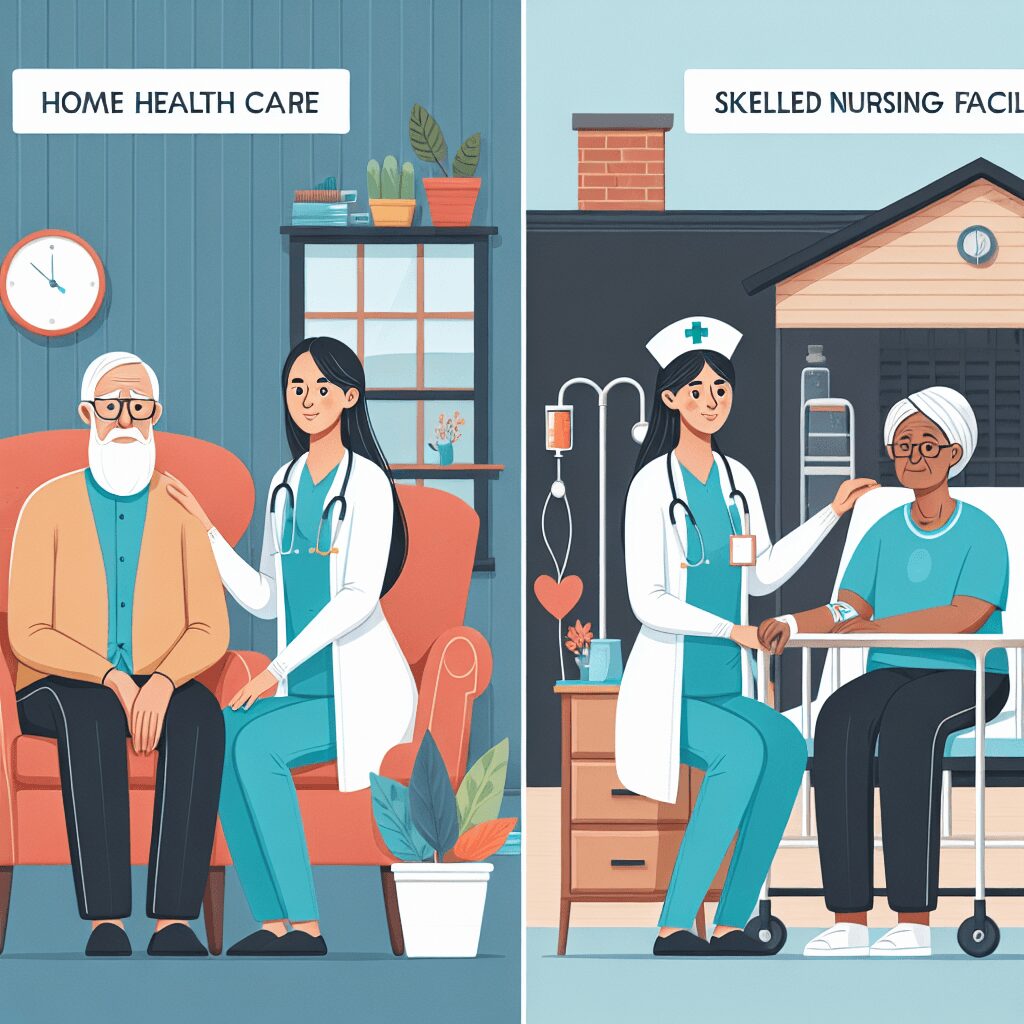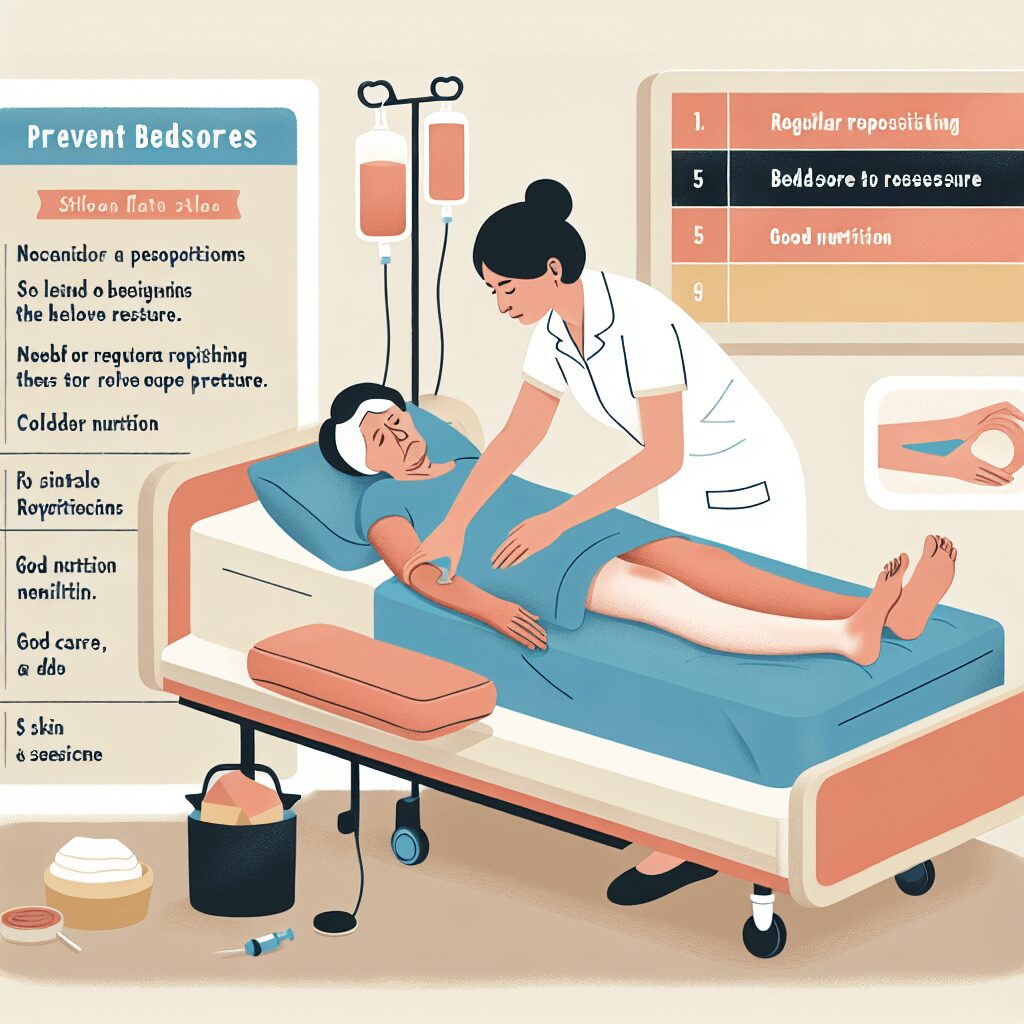Are you trying to choose between home health care and skilled nursing care for a senior loved one? It’s important to understand the difference between these two types of care.
In part one, we examined skilled home care services provided by skilled nurses. In part two, we will discuss non-skilled in-home care services that focus on daily support and help for seniors.
Let’s explore the key variances between these two types of care to help you make the best choice for your loved one’s health and happiness.
What is the difference between home health and SNF?
Home Health Services
Home health services and Skilled Nursing Facility (SNF) services differ based on the medical needs they address.
In SNFs, the focus is on medical assistance like wound care and medication management. Meanwhile, home health services prioritize everyday care needs for seniors.
Medicare coverage also varies between the two. Home health services are generally more affordable and can be covered by certain Medicare plans, unlike SNF services.
Home health services cover a wide range of care, including personal care (e.g., bathing and grooming), lifestyle support (such as housekeeping and meal preparation), and 24/7 monitoring post-hospitalization.
The goal of these services is to aid seniors in recovery, maintain independence, and slow health decline. Home health services aim to promote independence and enhance functional outcomes for Medicare beneficiaries by tailoring care to individual needs. This approach serves as a cost-effective alternative to extended hospital stays or nursing facilities.
SNF Services
SNFs offer specialized services like medical help with wound care, managing medications, and recovery support. These services are different from home health services. SNFs help individuals with higher medical needs, while home health services focus on everyday care for seniors. At SNFs, seniors can get rehabilitation, medical care, and skilled nursing services. These services aim to address their medical conditions and help in their recovery and independence.
Medicare Coverage
Home Health Medicare Coverage
Home health care services covered under Home Health Medicare Coverage include a wide range of services. These services can be provided at home for various illnesses or injuries. They aim to treat the illness, promote recovery, maintain independence, and slow the decline of Medicare beneficiaries.
Skilled nurses provide medical care under home health coverage. This care includes services like wound care, patient education, injections, and intravenous therapy. Non-skilled in-home care focuses on everyday care needs like personal care, fall prevention, medication reminders, and lifestyle support.
Home healthcare services are usually more cost-effective, convenient, and effective compared to care in a hospital or skilled nursing facility.
Home Health Medicare Coverage differs from skilled nursing facilities coverage. Home health care emphasizes care at home for rehabilitation and illness management. In contrast, SNFs offer a higher level of treatment intensity and 24-hour monitoring in a nursing facility.
Patients discharged to home health care have a slightly higher 30-day readmission rate than those discharged to SNFs. However, they result in cost savings and comparable functional outcomes.
Understanding the differences in patient outcomes, Medicare spending, and care settings can help in making informed decisions regarding post-acute care for Medicare beneficiaries.
SNF Medicare Coverage
Skilled Nursing Facilities (SNFs) offer various services under Medicare coverage. These include medical care, therapy, medication management, and rehabilitation for individuals needing post-acute care. To qualify for SNF Medicare Coverage, individuals must require skilled nursing or rehabilitation services after a hospital stay.
Medicare beneficiaries discharged to SNFs receive personalized care to improve functional outcomes. SNFs provide 24-hour monitoring and intensive treatment. On the other hand, home health care agencies like Caring Family offer services for those who prefer care at home.
Medicare covers post-acute care in both SNFs and home care settings. SNFs demonstrate reduced readmissions but are linked to higher Medicare spending compared to home health care. Understanding the advantages and disadvantages of each care setting is important for balancing patient outcomes, Medicare payments, and post-acute care value.
Types of Care Provided
Skilled Home Care in Home Health
Skilled home care is different from non-skilled home care. Skilled care involves medical assistance for tasks like medication management and wound care. Non-skilled care helps with everyday activities such as grooming, meal prep, and household chores.
In skilled home care, services include wound care, patient education, IV therapy, injections, and monitoring of serious illnesses. Factors to consider when choosing skilled care for a senior loved one are the medical needs, rehabilitation needs, and potential for independence and functional outcomes.
Assessing specific medical requirements and health goals is crucial. This ensures that the individual gets the right care at home to aid recovery and maintain independence.
Non-Skilled Home Care in Home Health
Non-Skilled Home Care in Home Health offers different types of care. They include personal care like bathing, grooming, and medication reminders. There’s also lifestyle support such as housekeeping, meal preparation, and transportation.
This care is usually provided long-term to help seniors with their daily needs and support their independence.
Transitioning from the hospital to Non-Skilled Home Care in Home Health involves assessing the individual’s medical needs. It helps determine the right level of care for their recovery and well-being. This process may include working with healthcare providers and coordinating with Medicare for coverage options. Agencies like Caring Family offer home health services.
Duration of Care
Home Health Duration
Factors influencing the duration of home health care:
-
Patient’s medical need
-
Type of services needed for recovery or managing illness
-
Coverage by Medicare or other health insurance
Home health care aims to:
-
Provide personalized care at home
-
Help patients recover
-
Maintain independence
-
Manage health conditions
Comparison with care in a skilled nursing facility :
-
Home health care duration varies based on patient progress and needs
-
Typically shorter as patients transition to managing health at home
-
SNF care may be longer and more intensive for continuous monitoring and treatment
Understanding care duration in different settings is important for:
-
Providing appropriate support to individuals recovering
-
Making the right choice based on medical needs, outcomes, and insurance coverage for effective care delivery.
SNF Duration
Factors affecting the length of care in a Skilled Nursing Facility are the patient’s medical needs, condition complexity, and therapy intensity for rehabilitation.
SNF patients may need more extended care due to the specialized skilled care and monitoring offered.
Care duration in an SNF differs from settings like in-home care or nursing homes by focusing on intense medical care, therapy, and rehabilitation for acute health issues or post-surgery recovery.
The duration of care in an SNF significantly impacts patient outcomes and recovery by improving functional outcomes and reducing hospital readmissions.
Longer-term care in SNFs often leads to enhanced recovery and independence because of the comprehensive medical services and round-the-clock monitoring.
Transition from Hospital to Home Care
Transitioning from the hospital to home care includes important steps:
Patients must decide the level of care needed after leaving the hospital – like skilled nursing, in-home care, or rehabilitation services.
It’s crucial to understand the patient’s medical needs and Medicare coverage to choose between skilled nursing facilities or home care.
Effective coordination involves working with healthcare providers, home health agencies, and skilled nursing facilities for a smooth transfer of care.
This coordination sets up a care plan covering the patient’s medical condition, medication, therapy, and lifestyle support.
Utilizing resources like Medicare payments for post-acute care helps patients and families confidently navigate the transition, supporting independence and well-being at home.
Leading Provider in Home Health Services
Benefits of Choosing Home Health Care
Choosing home health care is beneficial because it allows care to be received at home rather than in an institutional setting like a skilled nursing facility.
Home health services cover a wide range of care, such as personal assistance with daily activities, medication management, fall prevention, and incontinence care.
In contrast, skilled nursing facilities focus primarily on medical care and rehabilitation services.
Home health care is usually more cost-effective under Medicare than skilled nursing facilities, making it a preferred choice for many Medicare beneficiaries.
While Medicare generally doesn’t cover non-skilled home care services, exceptions based on medical needs may allow coverage for specific personal care needs.
Home health care promotes independence, personalized care, and tailored services, making it a valuable option for those needing quality medical and non-medical assistance at home.
Choosing the Right Care for Your Senior Loved One
Factors to Consider
When deciding between home health and skilled nursing facility services, it’s important to consider the medical needs of the individual.
Home health care focuses on everyday care and needs, while skilled nursing provides medical assistance like medication management and wound care.
Medicare coverage varies between the two, with home health care often being more affordable and covered by many plans, making it ideal for healing and maintaining independence.
Factors to consider when choosing care for a senior loved one include the level of medical assistance needed, the need for rehabilitation or therapy, and the desired level of independence and personal care.
Understanding differences in patient outcomes, medicare payments, and the impact of post-acute care settings can help in making an informed decision for the overall well-being of the individual needing care at home.
FAQ
What is the difference between home health and a skilled nursing facility (SNF)?
Home health provides medical services in the patient’s own home, while a skilled nursing facility provides around-the-clock medical care in a facility setting. Home health may involve services like nursing care and physical therapy, whereas SNF provides a higher level of medical care for patients who need intensive rehabilitation or medical supervision.
Can you receive similar home health care as you would at an SNF?
Yes, you can receive similar home health care as you would at an SNF. Both provide skilled nursing care, therapy services, and assistance with daily activities. Home health may include services like wound care, medication management, and physical therapy, which are also offered in an SNF.
How do you decide between home health and an SNF for a loved one?
Consider the level of care needed. Home health is suitable for those needing minimal assistance, while an SNF is better for individuals requiring more intensive, round-the-clock care. Discuss with healthcare professionals to determine the best option for your loved one.
Are there financial differences between home health and an SNF?
Yes, there are financial differences between home health and a SNF. Home health care typically costs less than a SNF because the patient is able to receive care in their own home, avoiding room and board fees associated with a SNF.
Do patients have more independence with home health compared to an SNF?
Yes, patients typically have more independence with home health compared to an SNF. In a home health setting, patients have more control over their daily activities, schedules, and surroundings. They can also receive care in the comfort of their own home, leading to a higher level of independence.
Understand the key differences between home health care and skilled nursing facilities (SNFs) with ABET Life Home Health & Caregiving. Our in-home care services provide personalized, one-on-one attention in the comfort of your own home, offering flexibility and convenience. Experience compassionate care tailored to your needs without the need to relocate to a facility. Contact us today to learn more about how our home health services can be the right choice for you or your loved one.








